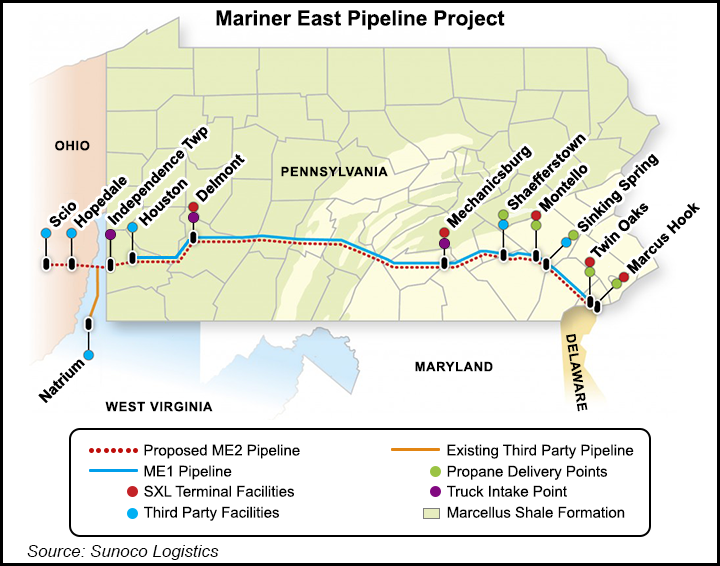Shale Daily | E&P | Marcellus | NGI All News Access
Mariner East Wins Another Eminent Domain Court Battle
Another Pennsylvania court has handed Sunoco Logistics Partners LP a victory as it pushes forward with development of the Mariner East pipeline project to transport natural gas liquids (NGL).

The Washington County Court of Common Pleas ruled this month that the Mariner East 2 pipeline meets the criteria of a public utility with eminent domain rights. The ruling would allow the company to condemn property it needs for easements to connect the pipeline with a gas processing facility in southwestern Pennsylvania.
The Washington County complaint was filed by a group of landowners that had argued the project is an interstate pipeline that falls under federal jurisdiction and not state laws governing eminent domain. In October, the Cumberland County Court of Common Pleas ruled against six landowners that had made a similar argument (see Shale Daily, Oct. 6). The Cumberland County court’s ruling was the first to recognize the pipeline as an intrastate system with public utility status and eminent domain power.
A previous ruling in York County found that the pipeline was an interstate system with no eminent domain power, but other cases against the project are still pending in Washington and Westmoreland counties.
The 350-mile Mariner East 2 would transport ethane, butane and propane from processing and fractionation complexes in eastern Ohio, western Pennsylvania and West Virginia to the Marcus Hook Industrial Complex, a former oil refinery near Philadelphia that’s being repurposed for NGL storage, processing and distribution to domestic and international markets.
Sunoco’s Mariner East 1 is already delivering propane, and in September the company announced a binding open season for a third pipeline in response to shipper demand (see Shale Daily, Sept. 14). If constructed, the three pipelines would have a total capacity of 770,000 b/d. Construction on Mariner East 2 is expected to begin next year.
Sunoco said the Washington County ruling was consistent with those of other courts in the state, adding that eminent domain is a last resort. Sunoco filed in 2014 for public utility status with the Pennsylvania Public Utility Commission seeking exemptions from local zoning ordinances, but later withdrew its request (see Shale Daily, March 9).
© 2024 Natural Gas Intelligence. All rights reserved.
ISSN © 2577-9877 | ISSN © 2158-8023 |
